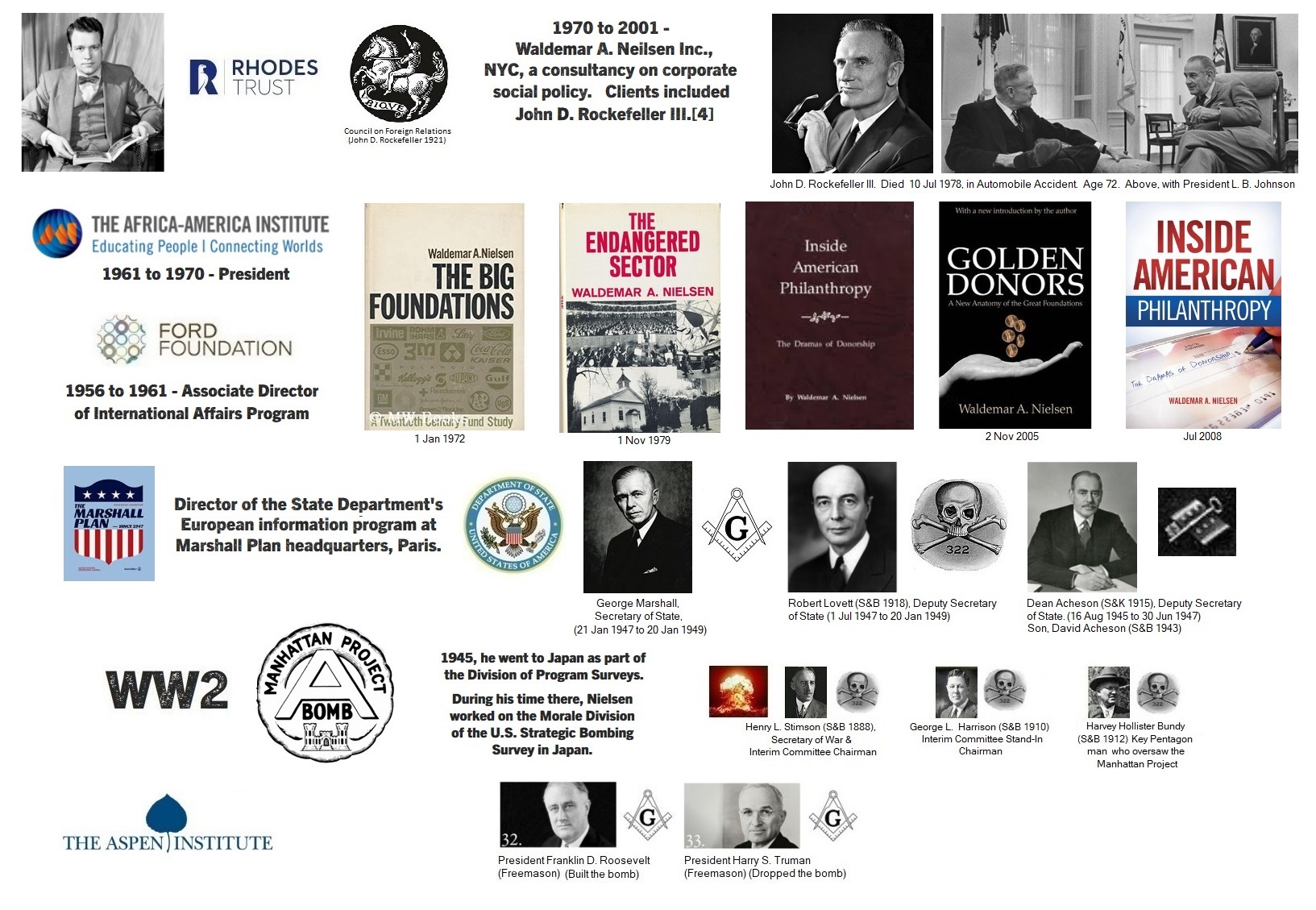
Waldemar August Nielsen (Rhodes 1939)
Expert on Charitable Foundations. Rhodes Scholar, University of Oxford. Council on Foreign Relations.[2]
Over the years, he was affiliated with the Aspen Institute.[2]
His seminal work, “The Big Foundations” (Columbia University Press, 1972) parted the curtain on the secretive world of private fortunes and public largess. An encyclopedic work, it profiled, one by one, philanthropies with assets of $100 million or more — the “Big 33” of that era — topped by the Ford Foundation, which had $3.6 billion at the time the book was being compiled. The book, which included sketches of the founding philanthropists — Carnegie, Kellogg, Ford, Rockefeller, Mellon, DuPont and others — reflected as well on the American character and American business.[2]
Mr. Nielsen examined, and often found wanting, the foundations’ performance and the ways in which they responded to challenges to their tax-exempt status and demands for openness and diversification. He deemed them generally timid, inert and unimaginative but saw them, potentially, as a force for public good.[2]
Reviewing the book for The New York Times, Thomas Lask wrote that Mr. Nielsen “has exposed for scrutiny the history, workings and rationale of institutions we have heard a lot of and know little about.” The review went on to say that there was “very little” in Mr. Nielsen’s presentation to warrant optimism about secretive, unaccountable institutions born as “playthings of the very rich” and past their social utility.[2]
In “The Golden Donors” Mr. Nielsen wrote that “in the great jungle of American democracy and capitalism there is no more strange or improbable creature than the private foundation. Private foundations are virtually a denial of basic premise: aristocratic institutions living on the privileges and indulgence of an egalitarian society; aggregations of private wealth, which, contrary to the proclaimed instincts of Economic Man, have been conveyed to public purposes. Like the giraffe, they could not possibly exist, but they do.”
People familiar with the business of philanthropy agree that foundations bristled at Mr. Nielsen’s candor, which thrust them uncomfortably into the spotlight, but that his stinging criticism ultimately brought changes.
2000 - A Nielsen chair in philanthropy was endowed in his honor at Georgetown University’s Public Policy Institute.[2]
1970 - started his own firm, Waldemar A. Neilsen Inc., a consultancy on corporate social policy, which he ran in New York until four years ago [2001].[2] He advised such prominent philanthropists as John D. Rockefeller III.[4]
1969, Published The third volume, “The Great Powers in Africa” (Praeger, 1969), published for the Council on Foreign Relations, gained the author wide recognition.[2]
His first three books dealt with issues facing Africa.[2]
1961 to 1970 - President of African-American Institute.[2]
1956 to 1961 - Associate Director of International Affairs Program at Ford Foundation.[2]
1952 - Joined the Ford Foundation, as deputy director of its behavior sciences division. Rose to executive assistant to the president and associate director international affairs, dealing with the foundation’s programs overseas.[2]
Early in his career, Mr. Nielsen worked in government, disseminating information about the Marshall Plan to the American taxpayer and to its beneficiaries in Europe.[2]
He was a special assistant to the secretary of commerce in Washington after the war and lived in Paris as deputy and later director of the State Department’s European information program at Marshall Plan headquarters.[2]
In 1945, he went to Japan as part of the Division of Program Surveys. During his time there, Nielsen worked on the Morale Division of the U.S. Strategic Bombing Survey in Japan.[3]
From 1939 - Rhodes Scholar, Brasenose College, University of Oxford.[1]
University of Missouri. (B.A./ M.A.)[3]
Died 2 Nov 2005, from Not Known. Age 88
[2] - Waldemar Nielsen, Expert on Philanthropy, Dies at 88 By Wolfgang Saxon (Nov. 4, 2005)
[3] - Atomic Heritage Foundation- Profile - Waldemar August Nielsen (Rhodes 1939)
[4] - Inside American Philanthropy, The Dramas of Donorship By Waldemar A. Nielsen



Comments